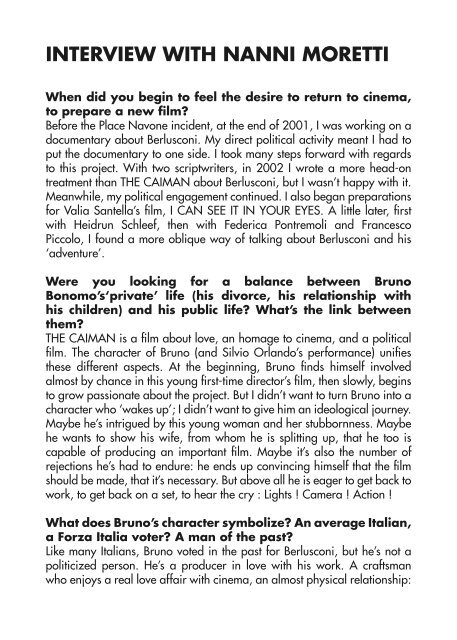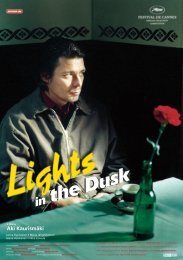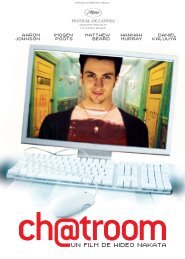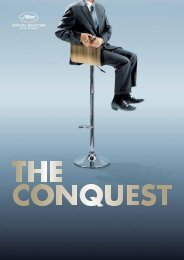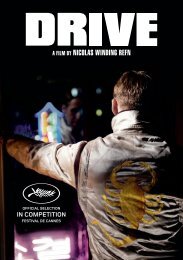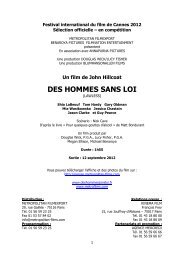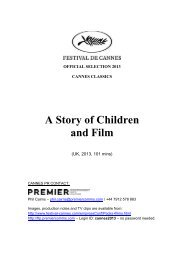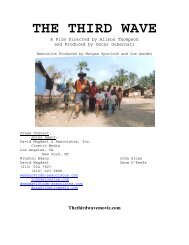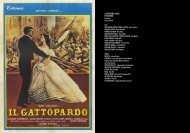in English - Cannes International Film Festival
in English - Cannes International Film Festival
in English - Cannes International Film Festival
Create successful ePaper yourself
Turn your PDF publications into a flip-book with our unique Google optimized e-Paper software.
INTERVIEW WITH NANNI MORETTI<br />
When did you beg<strong>in</strong> to feel the desire to return to c<strong>in</strong>ema,<br />
to prepare a new film?<br />
Before the Place Navone <strong>in</strong>cident, at the end of 2001, I was work<strong>in</strong>g on a<br />
documentary about Berlusconi. My direct political activity meant I had to<br />
put the documentary to one side. I took many steps forward with regards<br />
to this project. With two scriptwriters, <strong>in</strong> 2002 I wrote a more head-on<br />
treatment than THE CAIMAN about Berlusconi, but I wasn’t happy with it.<br />
Meanwhile, my political engagement cont<strong>in</strong>ued. I also began preparations<br />
for Valia Santella’s film, I CAN SEE IT IN YOUR EYES. A little later, first<br />
with Heidrun Schleef, then with Federica Pontremoli and Francesco<br />
Piccolo, I found a more oblique way of talk<strong>in</strong>g about Berlusconi and his<br />
‘adventure’.<br />
Were you look<strong>in</strong>g for a balance between Bruno<br />
Bonomo’s‘private’ life (his divorce, his relationship with<br />
his children) and his public life? What’s the l<strong>in</strong>k between<br />
them?<br />
THE CAIMAN is a film about love, an homage to c<strong>in</strong>ema, and a political<br />
film. The character of Bruno (and Silvio Orlando’s performance) unifies<br />
these different aspects. At the beg<strong>in</strong>n<strong>in</strong>g, Bruno f<strong>in</strong>ds himself <strong>in</strong>volved<br />
almost by chance <strong>in</strong> this young first-time director’s film, then slowly, beg<strong>in</strong>s<br />
to grow passionate about the project. But I didn’t want to turn Bruno <strong>in</strong>to a<br />
character who ‘wakes up’; I didn’t want to give him an ideological journey.<br />
Maybe he’s <strong>in</strong>trigued by this young woman and her stubbornness. Maybe<br />
he wants to show his wife, from whom he is splitt<strong>in</strong>g up, that he too is<br />
capable of produc<strong>in</strong>g an important film. Maybe it’s also the number of<br />
rejections he’s had to endure: he ends up conv<strong>in</strong>c<strong>in</strong>g himself that the film<br />
should be made, that it’s necessary. But above all he is eager to get back to<br />
work, to get back on a set, to hear the cry : Lights ! Camera ! Action !<br />
What does Bruno’s character symbolize? An average Italian,<br />
a Forza Italia voter? A man of the past?<br />
Like many Italians, Bruno voted <strong>in</strong> the past for Berlusconi, but he’s not a<br />
politicized person. He’s a producer <strong>in</strong> love with his work. A craftsman<br />
who enjoys a real love affair with c<strong>in</strong>ema, an almost physical relationship:


